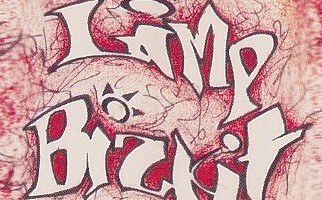[Interview] Peter Thornton on the Limp Bizkit Demotape and the Livebusiness
Limp Bizkit kamen in sein Studio, nahmen ein Demotape auf und gaben es an KoRn. Der Rest ist Musikgeschichte. Wie diese Kassette das Leben von Musikproduzent Peter Thornton (Shinedown, Paramore) verändert hat, erfahrt ihr im ausführlichen Interview. Ebenso packt er aus, welche US-Künstler wie auf der Bühne faken (ja, es sind sehr große Namen!) und warum Überproduktion ihn zur Weißglut bringt.

Maybe you can intruduce yourself? Hi.
Hey, how are you? My name is Peter Thornton and I’m from Jacksonville Florida […].
This is what happened actually: the first 6 months I worked at the studio I get calls from a guy named Fred Durst, like just „you gotta record my band“, this and that – I’m like „I don’t know who you are. Your music kinda sucks.“ […]
And then a guy named Donnie Smith came to me, who I respected in the music business, […] and he said „I got this band. They’re great. […] I need to record a demo“. And I’m like “okay”. I really wasn’t interested in doing it. I was just like „Dude, pay me, you know. Pay me the bands.“ Like, „When you come in the door give me $200, or whatever it was, and I’ll record you“.
So he brought them in. And it ended up being the same dude, that had been calling me for 6 months telling me he’s going to be the s*** and I was like “yeah, whatever. Everybody says that”. Obviously I was totally wrong.
We did it because they met KoRn and they said “We will pass this on to our producer Ross Robinson if you get us a decent demo” and so it was kinda urgent. It was like the day after the KoRn show at Milk Bar in Jacksonville […] and they had to have it done within a couple days. I think KoRn was leaving Florida. They wanted it to hand give it to them, or something like that. […] We recorded one night and did overdubs the next night and then I think we did vocal… I think, it was all done by like eight hours.
That’s crazy.
We did like three or four songs actually. […] We did Counterfeit and maybe one other song. I think a song called Armpit that’s really difficult to find, but I think I have it. […] and one other song. But Counterfeit, it’s the one that got them their record deal with Flip [Records], Jordan Schur.
[…]
You said you we’re finishing school. So you studied just in that time?
I went to school for recording and engineering in Orlando, Florida and then I graduated in ‘94 and I started work at the studio in late 94. The place is called Jazzmin Recording Studio and that’s where we did the Counterfeit EP. And I just graduated and so I’d only been working in the studio for a few months at the time that I recorded it.
So [it’s] one of your first works then?
[…] The first one that ever got released to the public. We only have eight tracks, I put four microphones on the drums… No, three drums! [One microphone on the] Bass, [one on the] Guitar, [one on the] Keyboards and two Vocals, that’s it.
[…]
After this record, you also produced some other nu metal bands.
Yeah, a band I actually got through them [Limp Bizkit]. A band called Cold and then Shinedown. […] I actually put that band together. The guy from Atlantic [Records] brought me Brett Smith, the singer and I was in Jacksonville doing a lot of demos and some small records for Atlantic. And this guy Steve Robertson, who A&R and Atlantic, brought me the singer, and I gather some guys and we put the band together [and] did some demos. And actually the demo for [the song] 45 is the one you hear on the record and on the radio.
Cool.
Yeah it was really cool. Well, it wasn’t cool that they paid me just a couple Grand to make once… they had to have me make that song really good… well, it wasn’t just me, it was me and Tony Battaglia this other producer. And then, when [sealing] the deal with Atlantic, they went on and had another guy produce the whole record, redo the song, remix it, spend hundreds of thousands of dollars. They remixed it twice, one by Andy Wallace and then another guy Randy Starr.
And the head of Atlantic just came back and said “No, I want this original version” this demo, or if you want to call it that. We’re not calling [it] a demo anymore. “This is the one going on the radio. This is the one going on the record. Scrap that. I don’t care we paid fifty thousand dollars to get that record remixed and produced over and over again”.
It was just one of the things […]. No one could do any better with it, so it was like “screw it”. Which I thought was kind of cool. A lot of times record company people, just because they spent the money they feel like they have to stick with it and sometimes the original thing is better than…
I mean, I got that with the Limp Bizkit thing. When the record came out, they put a different version of Counterfeit on there and I repeatedly had people say, “why don’t they put the demo one out there”. ‘Cause it’s something about capturing a really really good song with the right energy, the right moment, the right people in that room. And then to go and try to one-up it under a controlled environment, it loses something. It loses what made it special for some reason to me.
[…]

Can you tell us, what you’re doing right now as a producer? Because we’ve talked a lot about the past, so maybe it’s good to know what’s up next for Peter Thornton.
When I was in Orlando, I owned a pretty big recording studio. As you know, the recording business has really changed and a lot of stuff [is] being done at home Studios and in smaller situations and smaller budgets. I’m doing a lot of mixing. For some reason that’s the one area […] that’s like my strongest point. So I’ve had a few actually pretty heavy rock bands and nu metalesk bands send me stuff to mix.
[……..]
Live music here in the states is not really a big thing really anymore it doesn’t seem like it used to be it’s not like there’s a bunch of venues for bands to play more people are just making music on their computer. In fact, the last thing, I had send me to mix… it was a heavy, kinda nu metal sounding thing. But all the drums, I knew, were done on the computer and it was all processed sounding and there’s no real band. There’s some dude that made it on the computer [and] then play guitar and sang. It sucks! I’m not gonna mention what it is, but… to me that sucks, it needs to be a band.
[…] Not to mention, no one really considers music worth anything anymore. It’s all free basically or very cheap. Even though I made the Limp Bizkit thing for just a couple hundred bucks, no one values music anymore.
I mean, it’s on Spotify completely for free.
Yeah, if you buy a subscription to make $10 a month and that’s a problem, you know.
Just… for a second: Nu Metal, Metalcore, that kind of music. A lot of that is super processed in the computer now. The bass drum is all computerized and blah blah. […] If you appreciate that kind of music, there needs to be like “Okay this is the phony stuff and now this is the stuff where they actually played it”. You can take a little bit of education on the average listener to be like “Look, you can tell this is… robotic, not an actual human. And this is the real thing.”
You need to be able to have like a disclaimer or something like… kind like a movie like “Okay, there’s no CGI in this movie” [and] “This movie is basically a video game”. […] That’s the two differences in music. [There’s] some music that’s totally natural and real, and then you have the majority of it, that is just [a] totally fabricated representation of what… if a human was a robot would make music basically.
Isn’t it true, that nowadays bands even fake their vocals live…
Oh. Yeah, yeah yeah yeah. Absolutely.
… like doing autotune and stuff?
You can do autotune live. I know they mix in, especially in large venues, other track vocals all the time, all the time! Nowadays, anything that’s large production… Even if they don’t use it, they have a backup vocal going all the time, that they’ll sneak into the mix… the live sound guy will… if the vocalist isn’t pulled off right, or vocal mic is out of range, or is off the wrong access, you know, for the singer. [I] rarely trust a live show, unless it’s like Eric Clapton or some classic performer that would never do something like that.
I was a bit puzzled, because I was at Rock Am Ring in 2014 and there was Linkin Park playing on the main stage. And I listened to it again and Chester used autotune, I thought at least.
Yes, I would not doubt it at all. They do have an autotune, that had it for years where it’s like a hardware unit. It will do it in real time. Yeah, I’m sure he does. And I think they are a great band. But I saw them in […] 2008 and there was autotune used on all that.
So they just mixed it in every song?
Not only do they use it on the vocals, as it’s happening. They have multiple layers of the same vocal on pre-recorded tracks. Because everybody’s playing to a metronome click track, they’re all tied to a computer. You notice a lot of those bands, they don’t ever just rock out and go [off] on a tangent […] and do a guitar solo… [like] you don’t know where it’s gonna end. Everything is timed perfectly because it has to sync up.
Because then the fake will be noticed?
Will not be in sync anymore, yeah. […]

(Publikum bei einem Linkin Park Konzert in Berlin. Foto: Klenner99)
Which live bands should I trust?
None of those types. There’s too much technology involved in the production of those records. It wouldn’t sound live like that. A band you probably could trust, who I don’t even like, are the [Red Hot] Chili Peppers, that’s probably pretty much the way they are. […] [And] a Band, that I have seen many times and I know the guys […]. Yes, they use a lot of stuff, but they actually try to do as much live as possible, but they still do have that going on but they really try to make it all real, are 30 Seconds to Mars.
Yeah, everyone knows ‘em [here]
[…] They still have loops and things going in sequences, but they try to make it more real, where Linkin Park it’s almost like… there’s too much going on. They have guitar tracks.
With the Shinedown shit, I had to make guitar tracks for the live show, that the sound guy would bring in, that when the guitar player wasn’t even playing. It was like a double and a triple that we have done on the record.
What a double or a triple? So you recorded…
Guitar, yeah. When you hear the guitar player play, he’s playing a lot of times to tracks that already were recorded.
So just for the live performance they went into the studio and just recorded the guitar in [a] perfect way…
Or in this situation […] we took the recording session, isolated out the guitar tracks, gave it to the sound guy, and he blurted in during the song. […] That’s not uncommon at all. […] So they’re all basically slave to a computer thing.
Like the Puddle of Mudd thing who did lip syncing, didn’t he.
Yeah, it’s really tough, unless you see him in a real small Club to know if it’s phony or not.
[…]
This was a very interesting conversation, so thanks a lot for talking to us. Is there something you like to say to our listeners?
Yeah I would love to hear some music from people. I want to get in touch with what might be the next thing […] in that music world […] that has a really big concept [or] idea, but is real. I want to hear from artists that want to make real records. I’m tired of doing all the computer stuff. It’s no fun. It made it no fun. Because it’s not a real thing.
[…] I would like to hear a new grouping or new trend in doing stuff and figuring out how to do it almost totally live and didn’t make a record that sounds as compelling as something overproduced, but you’re over producing it before you even get in the studio. You already know how to make your sound. You’re not doing the other way around. Most bands make a record in the studio [and] then they figure out how to fake it live. I think it should be the other way around now.
Vielen Dank an Peter Thornton für das Interview. Auch der Interviewer konnte kaum glauben, dass nach zwei Jahren eine spontane Zusage kam. Hat sich gelohnt, oder?
Interviewer: Stephan Wiefling (ja, er ist auch auf Twitter)
Offensichtlich gefällt dir hier, was du liest. Supportet uns gerne auf ShoutedFM mth.Alternative.